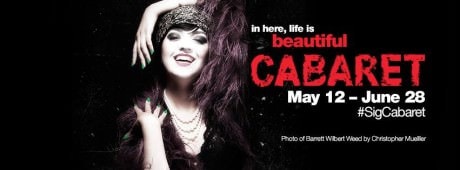Signature Theatre’s Cabaret is a formidable musical that abundantly succeeds in taking the audience by its collective throat and jolting it into alertness to the rise of evil and terror. Under Matthew Gardiner’s direction the production has a deliberate build on its acid, lethal journey. It is not a work of slap-happy shock and awe but more like a boa constrictor slithering under one’s feet and then ever so slowly constricting, almost unseen, until an unforgiving end.
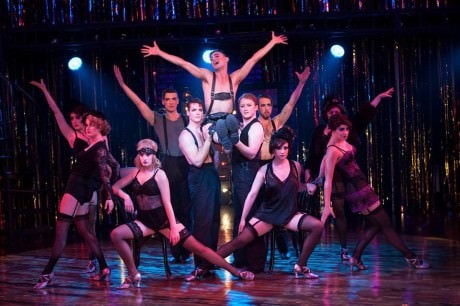
This Cabaret also has a noticeably slippery, rather asexual, framing to the personal relationships and conflicts at its center. The time is the early 1930s as Cabaret chronicles the far from smooth affair of young British cabaret singer Sally Bowles (Barrett Wilbert Weed) and new-to-Berlin, American writer Clifford Bradshaw (Gregory Woodell). The musical follows as well the relationship of an older pair; boarding house owner Fraulein Schneider (Naomi Jacobson) and Jewish fruit seller Herr Schultz (Rick Foucheux).
Overseeing all is the Master of Ceremonies at the Kit Kat Klub (Wesley Taylor). The Kit Kat Klub is where patrons are asked to leave their troubles outside to enjoy the stable of alluring, all virgins, Kit Kat Girls and Kit Kat Boys while Sally Bowles sings.
With book by Joe Masteroff, Cabaret is a based on the John Van Druten’s 1951 play I Am a Camera and stories by Christopher Isherwood. With music by John Kander and lyrics by Fred Ebb the show was a 1966 Broadway hit produced and directed by Harold Prince that won multiple Tony Awards including Best Musical. Since then there have been plenty of productions including one at Signature Theatre in 1996.
With the casting of Wilbert Weed and Woodell, this Cabaret seems a tale of two innocents out for a joyride of unencumbered misbehavior in the tawdry playground of Berlin. In her acting, Wilbert Weed projects the air of an inexperienced young woman trying to figure out her sexual allure, rather than a tough-minded, cynical working girl. In his work, Woodell has a softness about him that does toughen over time. Together as a couple the two give off rare sparks; having sex or creating a child together just seems unimaginable. And yes, there are clear early cues that Cliff’s sexual nature seems an unlit fuse and deeply buried. The bed in their room goes used for conversation and to sit or lay clothes.
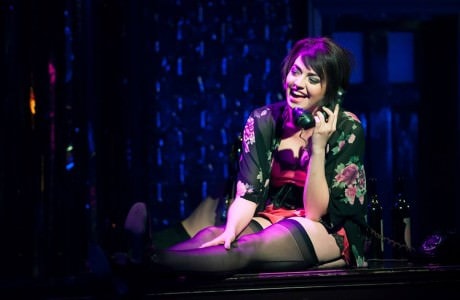
But, and it is a huge but, Wilbert Weed performance in Cabaret comes alive with her singing. Her voice is pure and sweet. Her delivery has the ability to look deeply into herself with projected feelings and eyes round as moons when she takes on the song “Maybe This Time” with its lyric: ‘Maybe this time, I’ll be lucky, Maybe this time, he’ll stay.’ She is gleeful when she teams up with the Kit Kat Girls on “Don’t Tell Mama.” And her rendition of Cabaret brings out muscle and pizazz.
Wesley Taylor’s performance as the Kit Kat Klub Emcee, is full of slimy charm, curled-finger sneering evil and pathos when required. He is a hustler who slinks about the stage in BDSM leather gear keeping the audience in rapt attention. His musical numbers: “Two Ladies,” “The Money Song,” and “If You Could See Her” are exuberant and athletically rendered. These numbers give a trajectory into the downward spiral of the cultural life in 1930’s Berlin.
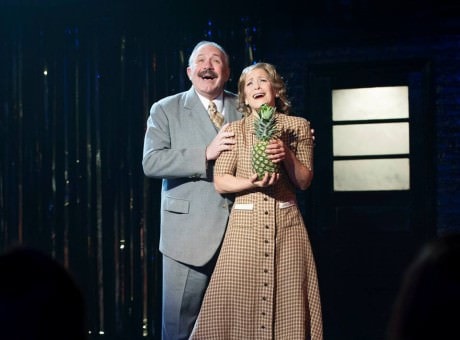
As the pair of older lovers Foucheux and Jacobson add superb gravitas and sweet sensuality to the production. As time goes by Foucheux transforms into man numb in disbelief to the rise of Nazism and its meaning to him as a Jew. Over time, he becomes disheveled in posture and clothes. Jacobson is strong voiced and strong willed when first appearing. Then as the Nazi menace grows she discards the man she thought she wanted in an act of personal survival as she sings “What Would You Do?”
Several other actors need special mention. There is Shayna Blass for her physical presence in the heartbreaking, without dialogue, last scene of Cabaret. And, Bobby Smith as a man with a secret that becomes clear-cut. He floats from a charming man with gleaming teeth, to a man at the center of evil at the Kit Kat Klub with a mouth clinched tightly giving orders with a swastika armband on.
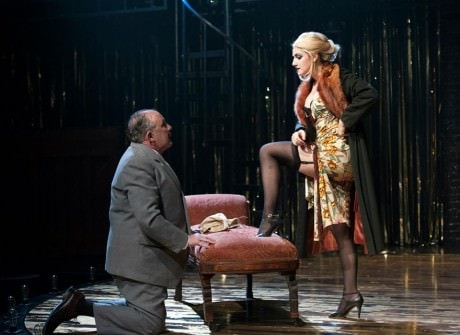
And then there is Maria Rizzo as Fraulein Kost, a tough working girl who will do what she ever she needs to do to survive. Her rendition of “Tomorrow Belongs to Me” to close Act I gave me shocks of real fear. There was a nastiness and hatred in her singing as she spat out the lyrics. There was more menace in the few minutes of that song, then I have witnessed in my own personal life in a very long time.
Music direction by Jon Kalbfleisch and his eight energetic musicians playing reeds, trumpet, trombone, accordion, guitar, bass, and drums filled the Signature Theatre MAX and the fictional Kit Kat Klub with a jazzy soundscape. Matthew Gardiner’s visually satisfying, loose limbed choreography for the Kit Kat Klub girls and boys was full of sinewy pelvic thrusts, gyrations, high leg kicks, long arms held high and an assortment of slaps, spanks and loud foot stomps.
Misha Kachman’s scenic design used the floor of the MAX for about 16 or so small round tables around which patrons (audience members) sat along with an in-theatre working bar to enhance the Cabaret experience for the audience during intermission. His set also included a turn-table and a long well-used cat-walk. Lighting design by Jason Lyons, sound design by Lane Elms, and costumes by Frank Labovitz thoroughly set the time and place, and the personality of each character.
Cabaret is a warhorse of musical theater now going on for five decades. Signature Theatre’s production is vital and forbidding in its political aspects. The musical numbers are sung with affection, care and strength when about the messiness of love and relationships. The musical numbers are sung with an acidic flavor when appropriate. As for the production numbers at the end of each Act, they each bring the House down. There are certainly plenty of new terrors out in the world since Cabaret first appeared; yet its bite remains sharp, deadly, and fresh in the current Signature Theatre production.
Running Time: Two hours and thirty minutes, with one 15-minute intermission.
Cabaret plays through June 28, 2015 at Signature Theatre — 4200 Campbell Avenue, in Arlington, Virginia. For tickets, call the box office at (703) 820-9771, or purchase them online.


